by Michael Eggleston* (Advanced Biofuels USA) On January 22, 2018, the 15th International Conference on Renewable Mobility titled “Fuels of the Future” was opened up by a discussion with Members of the European Parliament, as well as representatives from the European Commission and the German government, that addressed setting the political agenda for renewable mobility in Europe.
At the heart of this discussion was the recast of the role biofuels have in the Renewable Energy Directive (RED II).
From 2021 onward, it has been proposed by the Commission that the volume share of conventional crop-based biofuels in the transportation sector is to be gradually cut in half over the next decade. By 2050 this share would ultimately be phased-out completely in order to achieve carbon dioxide (CO2) reduction targets. Criticism around this discussion was led by the debate that these fuels compete for fertile land with respective agricultural and oleochemical industries.
Criticizing the Commission members for their hypocrisy, the Union for the Promotion of Oil and Protein Plants (UFOP) emphasized that EU biofuel producers must not be held responsible for the failings of environmental policy.
Whereas biofuels are being pressured to become sustainably certified, this is far from being the case for other industries in the expanding global vegetable oil market, elaborated the Union in their most recent annual report on progress and future prospects of biodiesel.
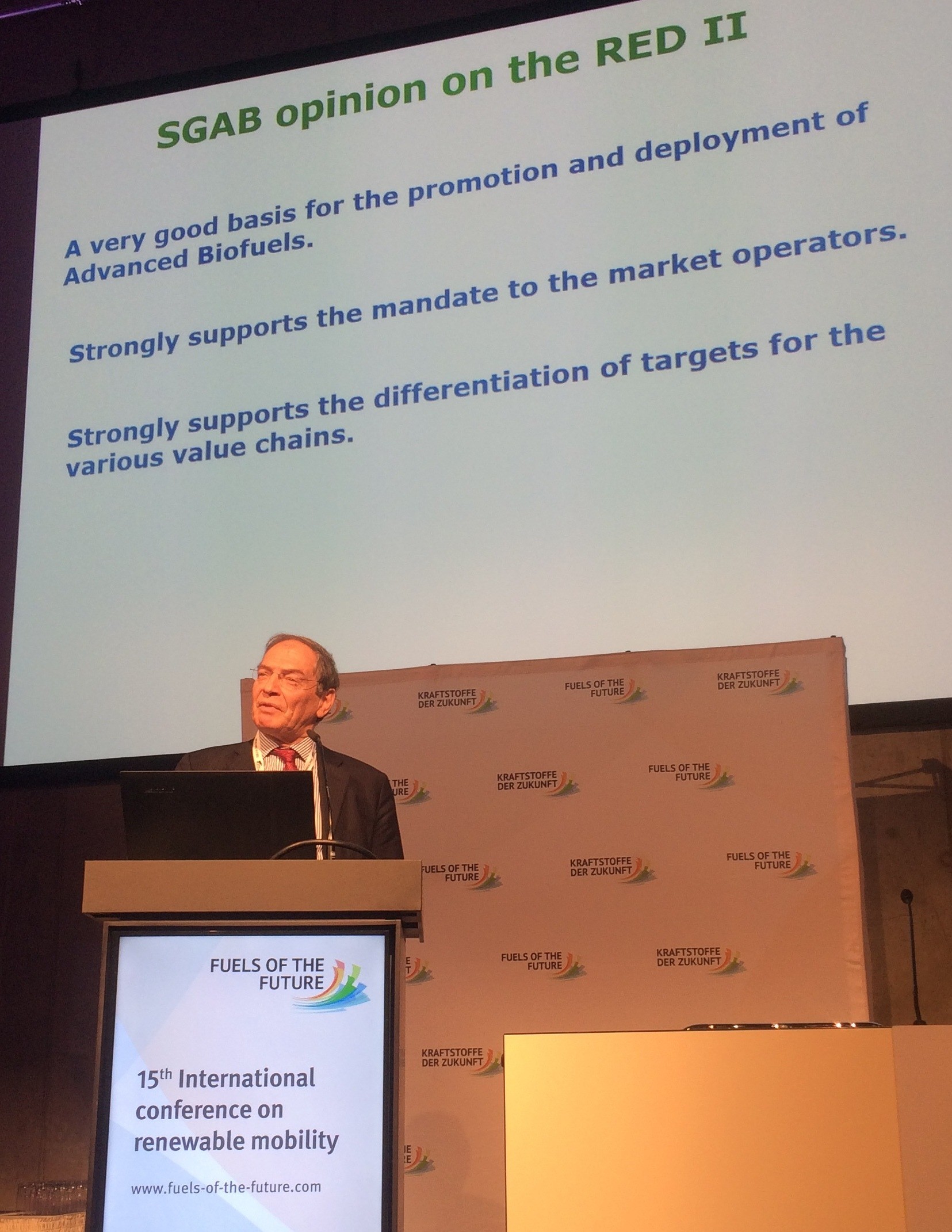 Kyriakos Maniatis, Director General of Energy for the European Commission, discussing the automotive industry’s position on renewable mobility in Europe
Kyriakos Maniatis, Director General of Energy for the European Commission, discussing the automotive industry’s position on renewable mobility in Europe
In order for secure growth to take place in meeting these reduction targets, a clear plan and mechanism must be spelled out for the transportation sector, suggested Kyriakos Maniatis, Director General of Energy for the European Commission.
Energy policy in the EU is driven by CO2 reduction targets which ultimately are focused on achieving near CO2 neutrality from all sectors by 2050. However, with policy makers pressured by the public’s concerns on conventional biofuel’s sustainability credibility, transitioning towards electro-mobility was estimated by Director of Climate Protection and Energy Policy at the World Wildlife Foundation (WWF) Germany, Michael Schäfer, to be the most “rational” decision. Schäfer disclosed that the organization believes that from 2030, new vehicles with an internal combustion engine should no longer be permitted by automotive manufacturers despite the position the German Parliament has taken.
Representing the Christian Social Union in Bavaria (CSU) and the German BioEnergy Association (BBE), Artur Auernhammer, replied that the increasing diversification of propulsion technologies, as well as the development and market introduction of alternative fuels, is a challenge, but at the same time is also the key to achieving the goals of climate protection. How Original Equipment Manufacturers (OEMs) will respond will ultimately be a consumer decision, he stated optimistically.
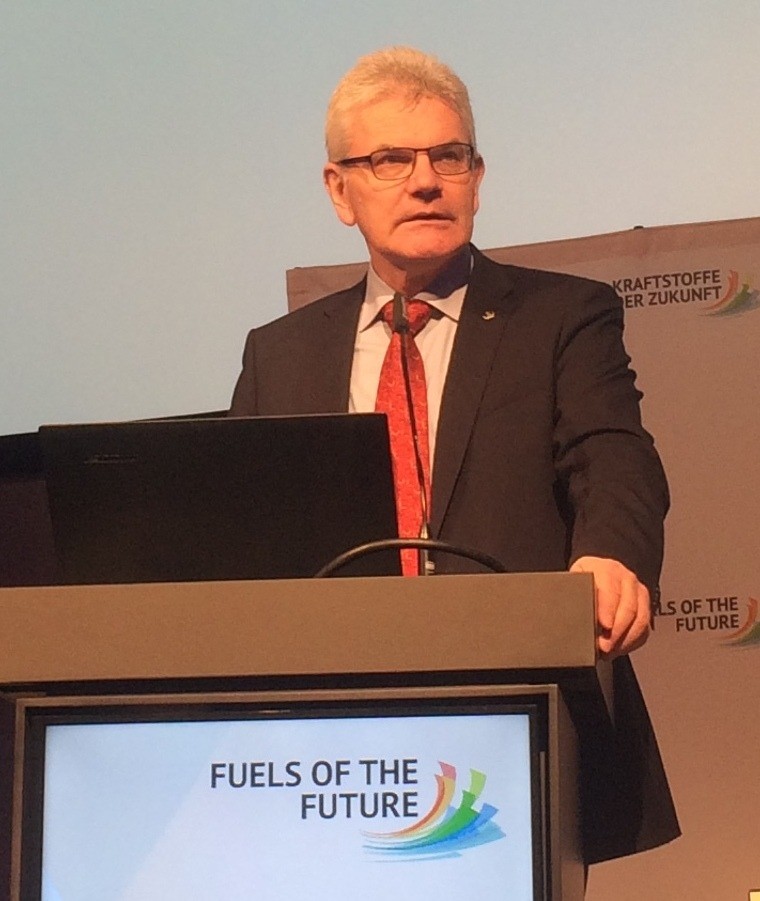 Member of the German Parliament, Artur Auernhammer discussing Biofuel’s role in climate mitigation and renewable mobility
Member of the German Parliament, Artur Auernhammer discussing Biofuel’s role in climate mitigation and renewable mobility
Further polarizing Germany’s position, the State Secretary for the German Federal Ministry for Transport and Digital Infrastructures (BVMI), Rainer Bomba, asserted that it’s impossible to imagine electro-mobility to be a sustainable and economic solution. He declared that cooperation amongst all member states must be made for an effective impact in the transport sector.
For British Petroleum (BP), trends with automotive consumers identify that electro-mobility is not yet a clear socio-economically attractive alternative.
Ruprecht Brandis, Director of External Affairs clarified results of a recent case study conducted by Aral that collected data from over 1,000 respondents all around Germany. Summarizing the research, he revealed that the majority of consumers still prefer a diesel or gasoline powered engine. About half of the survey participants considered the purchase of an electric vehicle to be a new investment. Out of those participants, only 5% of them considered making the change.
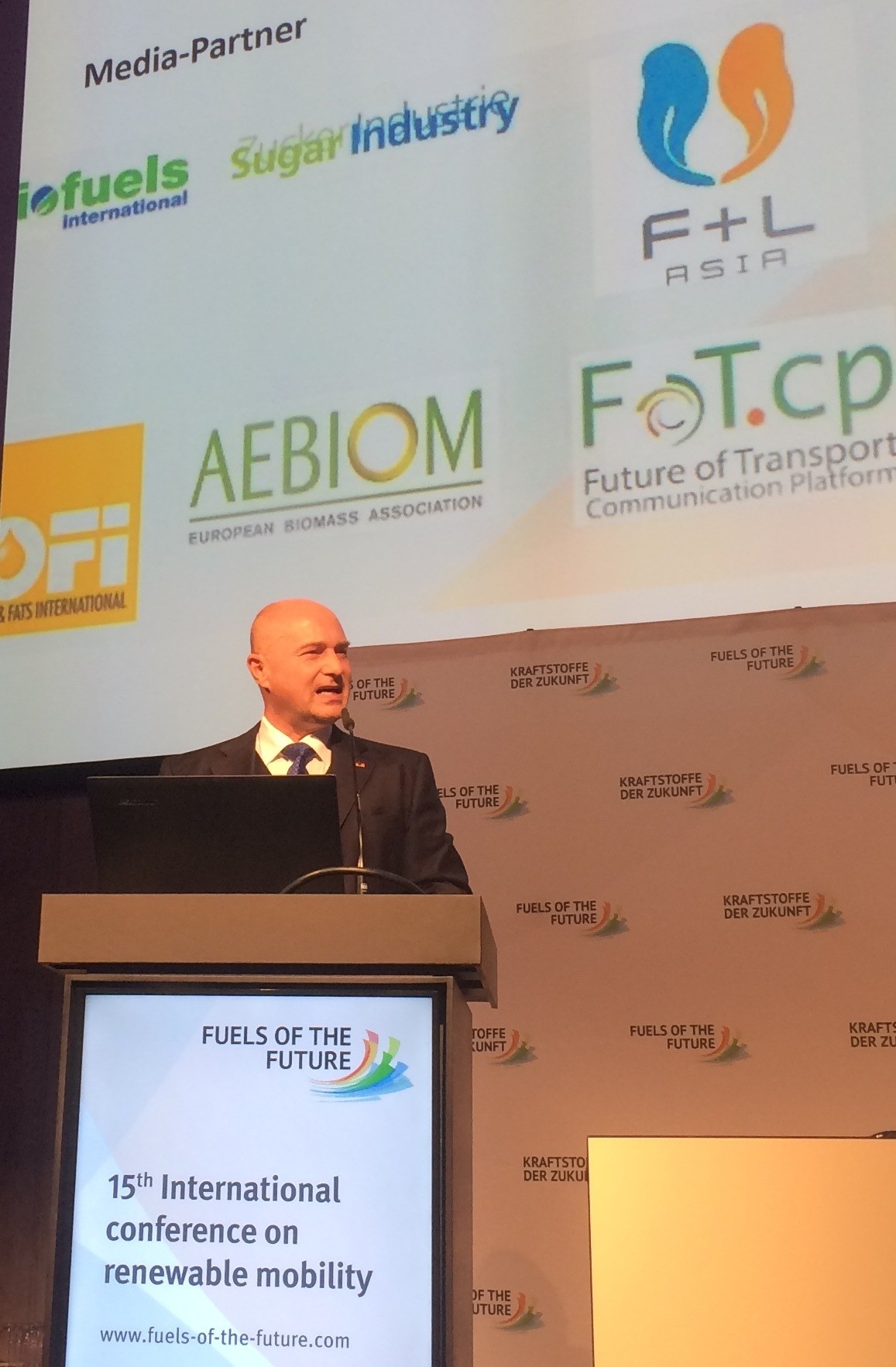 Rainer Bomba discussing the German Parliament’s position on biofuels as a climate mitigation solution and alternative fuel strategy
Rainer Bomba discussing the German Parliament’s position on biofuels as a climate mitigation solution and alternative fuel strategy
For the European Automotive Manufacturers Association, any abrupt transition away from diesel engines would provide additional challenges in meeting intermediate and long term CO2 reduction targets, responded Paul Greening, Director of Emissions and Fuel.
Long term targets for the European’s transportation sector must be made in the form of consumer incentives not quotas, he clarified. Currently, these incentives vary widely across EU Member States and are in need of harmonization in order to create a single effective market in the EU.
Bringing clarity to Dr. Greening’s position was member of the Parliament for Croatia, Marijana Petir. She elaborated that a realistic approach needs to be taken to achieve harmonization. Differences between member state capabilities need to be respected in supporting what capabilities they already have in developing a diversified renewable energy system.
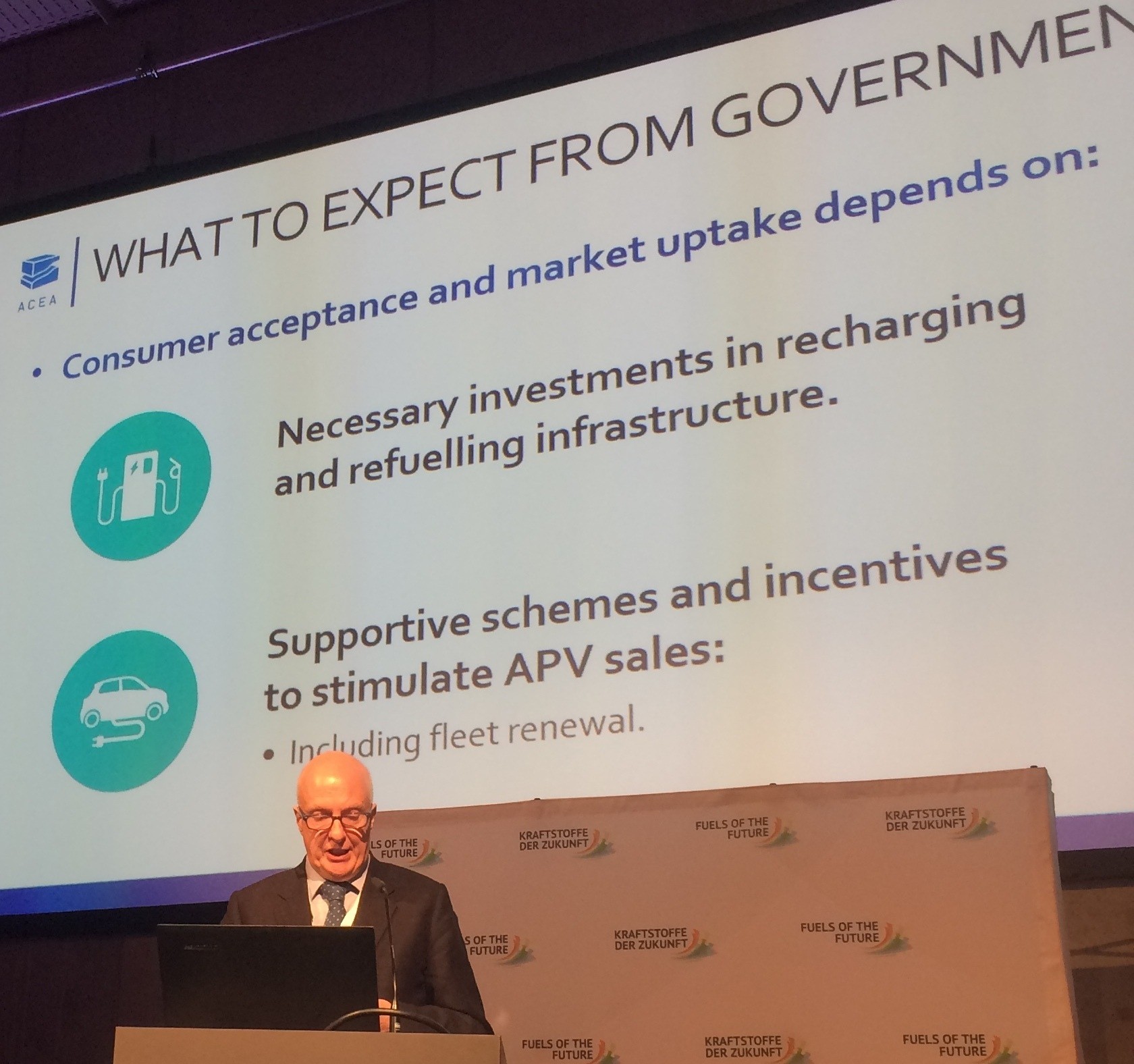 Paul Greening, Director of Emissions and Fuel, European Automotive Manufacturers Association discussing their road map to the future for the automotive industry
Paul Greening, Director of Emissions and Fuel, European Automotive Manufacturers Association discussing their road map to the future for the automotive industry
The International Renewable Energy Agency’s Senior Program Officer, Jeff Skeer, expressed that the transition to electro-mobility won’t happen everywhere, not in all sectors and not all at once.
He claimed that accelerated market penetration of electric vehicles (EVs) may weaken oil prices and thus secure biofuels’ competitive position over the long term.
With EVs projected to make up 30% of global transport by 2050, biofuels needs will be substantial for decades to come. The intergovernmental organization projects crop-based feedstocks to make up about three-quarters of total biofuel share in 2030 and about one half by 2050.
Skeer concluded in his presentation that biofuels will remain a long-term alternative in regional markets with weak power grids such as those in Africa and South Asia and in low-cost domestic markets such as those in Brazil. Where does this leave the future for conventional and the prospect of advanced biofuels in Europe?
Defending the position of the European Parliament was Bas Eickhout, member of the Parliament for the Netherlands and the European Green Party. He reiterated to delegates that the Parliament has always been consistent with their intentions in regards to their vision for the transport sector.
RED II was a political compromise to stunt growth of conventional biofuels in order to make room for advanced biofuels and other options, reassured Eickhout.
Answering the call to concerned biofuel producers he suggested that an increase in conventional biofuel volume share would only intensify the impact of poor performing feedstocks and compromise biofuels’ sustainability credibility.
Food price, however, is not a fair indicator of indirect land use change (iLUC), since public criticism surrounding conventional biofuel’s sustainability credibility only revolved around a spike in market price, he stated.
Eickhout concluded his presentation disclosing that if member states are to take the Paris Climate Agreement seriously that the future volume of advanced biofuels in the EU should not exceed that of current conventional biofuel levels.
A final compromise between the Commission, Parliament and the Environmental Council is expected to be announced around October of this year, revealed Eickhout. He reiterated Dr. Greening’s position that harmonization amongst member states is necessary for the development of an effective energy transition. It was predicted that this harmonization will take the form of binding measurement targets in the transportation sector. Till then, it has not yet been decided what positon Europe’s transportation sector will take; lacking a clear solution to meet the transportation sector’s CO2 reduction target goals.
______
All presentations from the conference are available for download until February 24th, 2018. (Password: berlin18)
Themes of the presentations revolve around the framework for the future of renewable mobility, the future of the combustion engine, biofuel market developments and electro-mobility prospects in the transport sector.
The next “Fuels of the Future ” conference will take place again in Berlin from 21st – 22nd of January 2019.
* Michael Eggleston is an aspiring policymaker studying interdisciplinary & intercultural communication with the University of Rhode Island’s International Engineering Program. He is spending a semester abroad at the Technische Universität Darmstadt in Darmstadt, Germany and will be reporting on and representing Advanced Biofuels USA at international conferences surrounding Europe’s energy transition.
Photos: M. Eggleston
updated for clarification 1/30/2018 10:20AM ET
Nearly 55,000 articles in our online library!
Use the categories and tags listed below to access the nearly 50,000 articles indexed on this website.
Advanced Biofuels USA Policy Statements and Handouts!
- For Kids: Carbon Cycle Puzzle Page
- Why Ethanol? Why E85?
- Just A Minute 3-5 Minute Educational Videos
- 30/30 Online Presentations
- “Disappearing” Carbon Tax for Non-Renewable Fuels
- What’s the Difference between Biodiesel and Renewable (Green) Diesel? 2020 revision
- How to De-Fossilize Your Fleet: Suggestions for Fleet Managers Working on Sustainability Programs
- New Engine Technologies Could Produce Similar Mileage for All Ethanol Fuel Mixtures
- Action Plan for a Sustainable Advanced Biofuel Economy
- The Interaction of the Clean Air Act, California’s CAA Waiver, Corporate Average Fuel Economy Standards, Renewable Fuel Standards and California’s Low Carbon Fuel Standard
- Latest Data on Fuel Mileage and GHG Benefits of E30
- What Can I Do?
Donate
DonateARCHIVES
- March 2026
- February 2026
- January 2026
- December 2025
- November 2025
- October 2025
- September 2025
- August 2025
- July 2025
- June 2025
- May 2025
- April 2025
- March 2025
- February 2025
- January 2025
- December 2024
- November 2024
- October 2024
- September 2024
- August 2024
- July 2024
- June 2024
- May 2024
- April 2024
- March 2024
- February 2024
- January 2024
- December 2023
- November 2023
- October 2023
- September 2023
- August 2023
- July 2023
- June 2023
- May 2023
- April 2023
- March 2023
- February 2023
- January 2023
- December 2022
- November 2022
- October 2022
- September 2022
- August 2022
- July 2022
- June 2022
- May 2022
- April 2022
- March 2022
- February 2022
- January 2022
- December 2021
- November 2021
- October 2021
- September 2021
- August 2021
- July 2021
- June 2021
- May 2021
- April 2021
- March 2021
- February 2021
- January 2021
- December 2020
- November 2020
- October 2020
- September 2020
- August 2020
- July 2020
- June 2020
- May 2020
- April 2020
- March 2020
- February 2020
- January 2020
- December 2019
- November 2019
- October 2019
- September 2019
- August 2019
- July 2019
- June 2019
- May 2019
- April 2019
- March 2019
- February 2019
- January 2019
- December 2018
- November 2018
- October 2018
- September 2018
- August 2018
- July 2018
- June 2018
- May 2018
- April 2018
- March 2018
- February 2018
- January 2018
- December 2017
- November 2017
- October 2017
- September 2017
- August 2017
- July 2017
- June 2017
- May 2017
- April 2017
- March 2017
- February 2017
- January 2017
- December 2016
- November 2016
- October 2016
- September 2016
- August 2016
- July 2016
- June 2016
- May 2016
- April 2016
- March 2016
- February 2016
- January 2016
- December 2015
- November 2015
- October 2015
- September 2015
- August 2015
- July 2015
- June 2015
- May 2015
- April 2015
- March 2015
- February 2015
- January 2015
- December 2014
- November 2014
- October 2014
- September 2014
- August 2014
- July 2014
- June 2014
- May 2014
- April 2014
- March 2014
- February 2014
- January 2014
- December 2013
- November 2013
- October 2013
- September 2013
- August 2013
- July 2013
- June 2013
- May 2013
- April 2013
- March 2013
- February 2013
- January 2013
- December 2012
- November 2012
- October 2012
- September 2012
- August 2012
- July 2012
- June 2012
- May 2012
- April 2012
- March 2012
- February 2012
- January 2012
- December 2011
- November 2011
- October 2011
- September 2011
- August 2011
- July 2011
- June 2011
- May 2011
- April 2011
- March 2011
- February 2011
- January 2011
- December 2010
- November 2010
- October 2010
- September 2010
- August 2010
- July 2010
- June 2010
- May 2010
- April 2010
- March 2010
- February 2010
- January 2010
- December 2009
- November 2009
- October 2009
- September 2009
- August 2009
- July 2009
- June 2009
- May 2009
- April 2009
- March 2009
- February 2009
- January 2009
- December 2008
- November 2008
- October 2008
- September 2008
- August 2008
- July 2008
- June 2008
- May 2008
- April 2008
- March 2008
- February 2008
- January 2008
- December 2007
- November 2007
- October 2007
- September 2007
- August 2007
- June 2007
- February 2007
- January 2007
- October 2006
- April 2006
- January 2006
- April 2005
- December 2004
- November 2004
- December 1987
CATEGORIES
- About Us
- Advanced Biofuels Call to Action
- Aviation Fuel/Sustainable Aviation Fuel (SAF)
- BioChemicals/Renewable Chemicals
- BioRefineries/Renewable Fuel Production
- Business News/Analysis
- Cooking Fuel
- Education
- 30/30 Online Presentations
- Competitions, Contests
- Earth Day 2021
- Earth Day 2022
- Earth Day 2023
- Earth Day 2024
- Earth Day 2025
- Executive Training
- Featured Study Programs
- Instagram TikTok Short Videos
- Internships
- Just a Minute
- K-12 Activities
- Mechanics training
- Online Courses
- Podcasts
- Scholarships/Fellowships
- Teacher Resources
- Technical Training
- Technician Training
- University/College Programs
- Events
- Coming Events
- Completed Events
- More Coming Events
- Requests for Speakers, Presentations, Posters
- Requests for Speakers, Presentations, Posters Completed
- Webinars/Online
- Webinars/Online Completed; often available on-demand
- Federal Agency/Executive Branch
- Agency for International Development (USAID)
- Agriculture (USDA)
- Commerce Department
- Commodity Futures Trading Commission
- Congressional Budget Office
- Defense (DOD)
- Air Force
- Army
- DARPA (Defense Advance Research Projects Agency)
- Defense Logistics Agency
- Marines
- Navy
- Education Department
- Energy (DOE)
- Environmental Protection Agency
- Federal Energy Regulatory Commission (FERC)
- Federal Reserve System
- Federal Trade Commission
- Food and Drug Administration
- General Services Administration
- Government Accountability Office (GAO)
- Health and Human Services (HHS)
- Homeland Security
- Housing and Urban Development (HUD)
- Interior Department
- International Trade Commission
- Joint Office of Energy and Transportation
- Justice (DOJ)
- Labor Department
- National Academies of Sciences Engineering Medicine
- National Aeronautics and Space Administration
- National Oceanic and Atmospheric Administration
- National Research Council
- National Science Foundation
- National Transportation Safety Board (NTSB)
- Occupational Safety and Health Administration
- Overseas Private Investment Corporation
- Patent and Trademark Office
- Securities and Exchange Commission
- State Department
- Surface Transportation Board
- Transportation (DOT)
- Federal Aviation Administration
- National Highway Traffic Safety Administration (NHTSA)
- Pipeline and Hazardous Materials Safety Admin (PHMSA)
- Treasury Department
- U.S. Trade Representative (USTR)
- White House
- Federal Legislation
- Federal Litigation
- Federal Regulation
- Feedstocks
- Agriculture/Food Processing Residues nonfield crop
- Alcohol/Ethanol/Isobutanol
- Algae/Other Aquatic Organisms/Seaweed
- Atmosphere
- Carbon Dioxide (CO2)
- Field/Orchard/Plantation Crops/Residues
- Forestry/Wood/Residues/Waste
- hydrogen
- Manure
- Methane/Biogas
- methanol/bio-/renewable methanol
- Not Agriculture
- RFNBO (Renewable Fuels of Non-Biological Origin)
- Seawater
- Sugars
- water
- Funding/Financing/Investing
- grants
- Green Jobs
- Green Racing
- Health Concerns/Benefits
- Heating Oil/Fuel
- History of Advanced Biofuels
- Infrastructure
- Aggregation
- Biofuels Engine Design
- Biorefinery/Fuel Production Infrastructure
- Carbon Capture/Storage/Use
- certification
- Deliver Dispense
- Farming/Growing
- Precursors/Biointermediates
- Preprocessing
- Pretreatment
- Terminals Transport Pipelines
- International
- Abu Dhabi
- Afghanistan
- Africa
- Albania
- Algeria
- Angola
- Antarctica
- Arctic
- Argentina
- Armenia
- Aruba
- Asia
- Asia Pacific
- Australia
- Austria
- Azerbaijan
- Bahamas
- Bahrain
- Bangladesh
- Barbados
- Belarus
- Belgium
- Belize
- Benin
- Bermuda
- Bhutan
- Bolivia
- Bosnia and Herzegovina
- Botswana
- Brazil
- Brunei
- Bulgaria
- Burkina Faso
- Burundi
- Cambodia
- Cameroon
- Canada
- Canary Islands
- Caribbean
- Central African Republic
- Central America
- Chad
- Chile
- China
- Colombia
- Congo
- Congo, Democratic Republic of
- Costa Rica
- Croatia
- Cuba
- Cyprus
- Czech Republic
- Denmark
- Dominican Republic
- Dubai
- Ecuador
- Egypt
- El Salvador
- Equatorial Guinea
- Estonia
- Eswatini/Swaziland
- Ethiopia
- European Union (EU)
- Fiji
- Finland
- France
- French Guiana
- Gabon
- Georgia
- Germany
- Ghana
- Global South
- Greece
- Greenland
- Grenada
- Guatemala
- Guinea
- Guyana
- Haiti
- Honduras
- Hong Kong
- Hungary
- Iceland
- India
- Indonesia
- Iran
- Iraq
- Ireland
- Israel
- Italy
- Ivory Coast
- Jamaica
- Japan
- Jersey
- Jordan
- Kazakhstan
- Kenya
- Korea
- Kosovo
- Kuwait
- Laos
- Latin America
- Latvia
- Lebanon
- Liberia
- Lithuania
- Luxembourg
- Macedonia
- Madagascar
- Malawi
- Malaysia
- Maldives
- Mali
- Malta
- Marshall Islands
- Mauritania
- Mauritius
- Mexico
- Middle East
- Moldova
- Monaco
- Mongolia
- Morocco
- Mozambique
- Myanmar/Burma
- Namibia
- Nepal
- Netherlands
- New Guinea
- New Zealand
- Nicaragua
- Niger
- Nigeria
- North Africa
- North America
- North Korea
- Northern Ireland
- Norway
- Oman
- Pakistan
- Panama
- Papua New Guinea
- Paraguay
- Peru
- Philippines
- Poland
- Portugal
- Qatar
- Republic of
- Romania
- Russia
- Rwanda
- Saudi Arabia
- Scotland
- Senegal
- Serbia
- Sierra Leone
- Singapore
- Slovakia/Slovak Republic
- Slovenia
- Solomon Islands
- South Africa
- South America
- South Korea (Republic of Korea)
- South Sudan
- Southeast Asia
- Spain
- Sri Lanka
- Sudan
- Suriname
- Sweden
- Switzerland
- Taiwan
- Tanzania
- Thailand
- Timor-Leste
- Togo
- Trinidad and Tobago
- Tunisia
- Turkey
- Uganda
- UK (United Kingdom)
- Ukraine
- United Arab Emirates UAE
- Uruguay
- Uzbekistan
- Vatican
- Venezuela
- Vietnam
- Wales
- Zambia
- Zanzibar
- Zimbabwe
- Marine/Boat Bio and Renewable Fuel/MGO/MDO/SMF
- Marketing/Market Forces and Sales
- Opinions
- Organizations
- Original Writing, Opinions Advanced Biofuels USA
- Policy
- Presentations
- Biofuels Digest Conferences
- DOE Conferences
- Bioeconomy 2017
- Bioenergy2015
- Biomass2008
- Biomass2009
- Biomass2010
- Biomass2011
- Biomass2012
- Biomass2013
- Biomass2014
- DOE Project Peer Review
- Other Conferences/Events
- R & D Focus
- Carbon Capture/Storage/Use
- Co-Products
- Feedstock
- Logistics
- Performance
- Process
- Vehicle/Engine/Motor/Aircraft/Boiler/Ship
- Yeast
- Railroad/Train/Locomotive Fuel
- Resources
- Books Web Sites etc
- Business
- Definition of Advanced Biofuels
- Find Stuff
- Government Resources
- Scientific Resources
- Technical Resources
- Tools/Decision-Making
- Rocket/Missile Fuel
- Sponsors
- States
- Alabama
- Alaska
- Arizona
- Arkansas
- California
- Colorado
- Connecticut
- Delaware
- Florida
- Georgia
- Hawai'i
- Idaho
- Illinois
- Indiana
- Iowa
- Kansas
- Kentucky
- Louisiana
- Maine
- Maryland
- Massachusetts
- Michigan
- Midwest
- Minnesota
- Mississippi
- Missouri
- Montana
- Native American tribal nation lands
- Nebraska
- Nevada
- New Hampshire
- New Jersey
- New Mexico
- New York
- North Carolina
- North Dakota
- Ohio
- Oklahoma
- Oregon
- Pennsylvania
- Puerto Rico
- Rhode Island
- South Carolina
- South Dakota
- Tennessee
- Texas
- Utah
- Vermont
- Virginia
- Washington
- Washington DC
- West Coast
- West Virginia
- Wisconsin
- Wyoming
- Sustainability
- Uncategorized
- What You Can Do
tags
© 2008-2023 Copyright Advanced BioFuels USA. All Rights reserved.
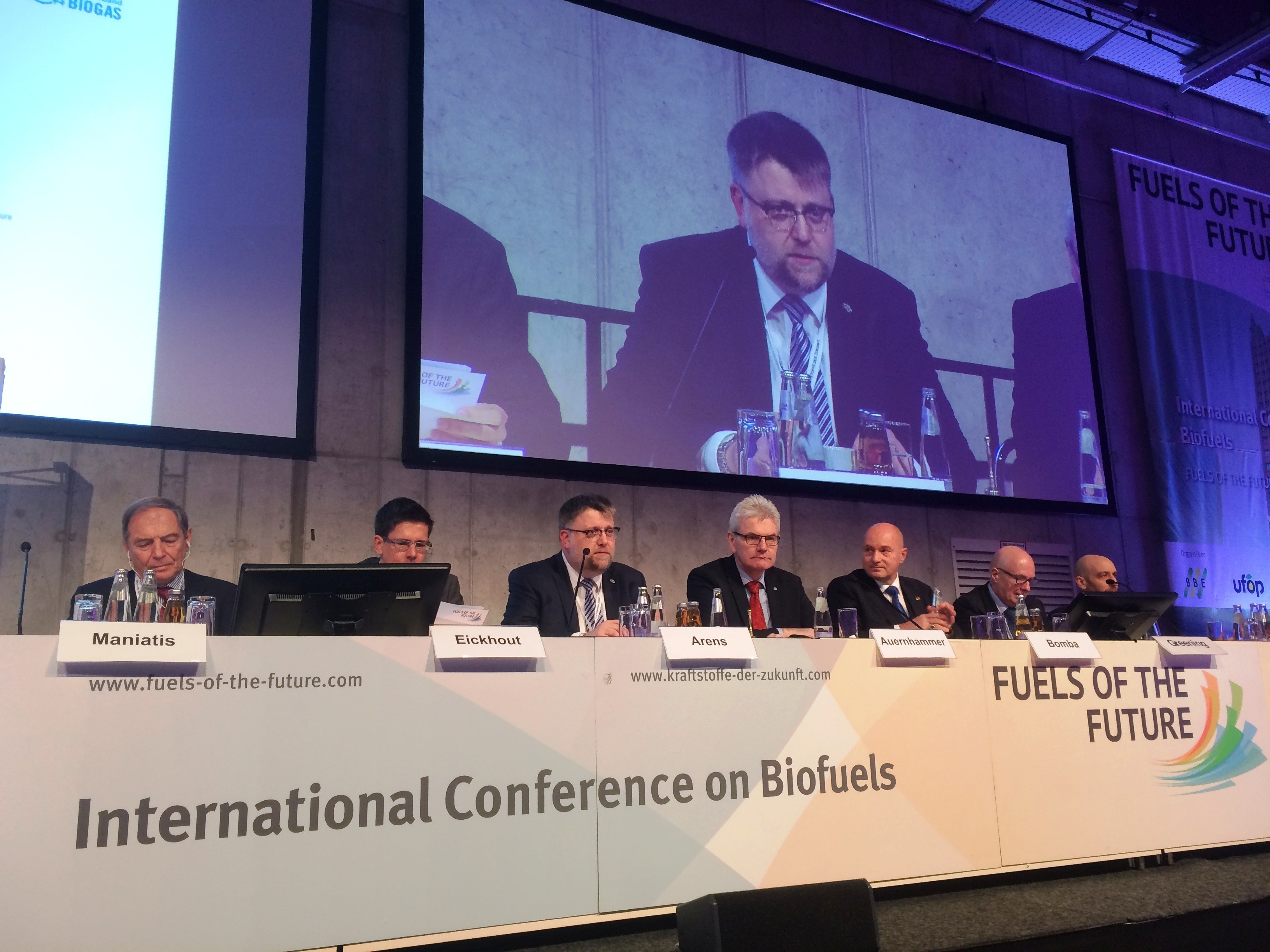
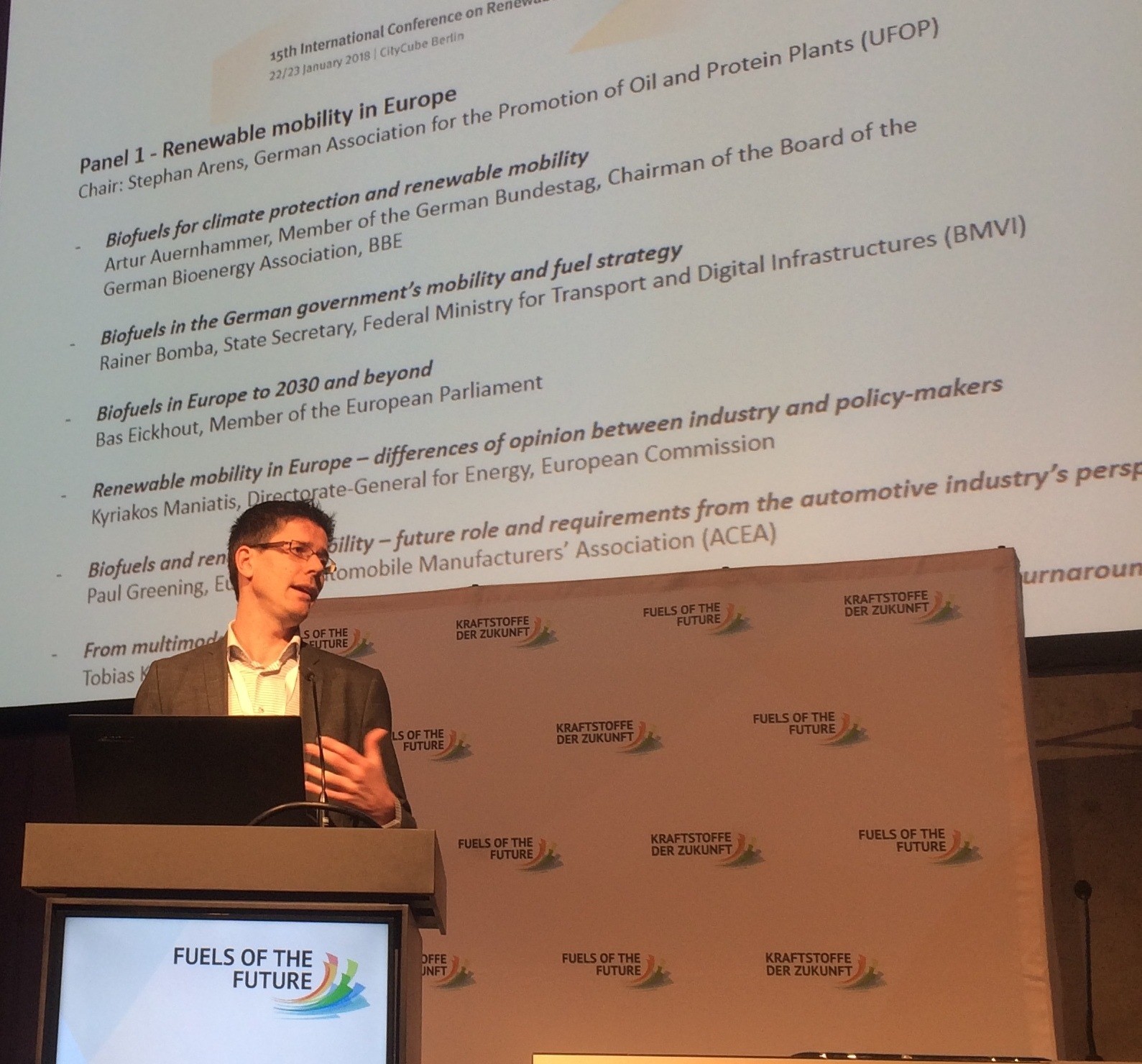
.jpg)





0 COMMENTS
Leave A Comment
Your Email Address wiil not be Published. Required Field Are marked*